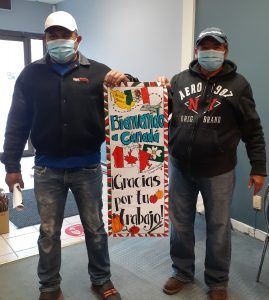
Kairos’ migrant workers project receives federal funding
Maryam Farag
Industry Government airport Canada COVID-19 foreign labour Ontario workers
Photo: Kairos: Canadian Ecumenical Justice Initiatives.
The Government of Canada has awarded Kairos Canada $1,896,308 to continue its Empowering Temporary Foreign Workers during COVID-19 project to support and assist temporary foreign workers during the pandemic, with a focus on the agricultural sector.
Funded by the Government of Canada’s Temporary Foreign Worker Program, this project targets the Maritimes and Ontario and ends on December 15.
Last year, the Government of Canada awarded Kairos $2.18 million to run the project from December 17, 2020 to June 30, 2021, with a one month extension to July 31.
In May, the project expanded to include airport support services to welcome, inform, and assist migrant workers arriving at Toronto Pearson International Airport on COVID-19 by providing information on quarantine measures, vaccinations, and additional supports.
Approximately 25,000 temporary foreign workers were served under this project during the first half of 2021.
Kairos will partner with 15 grassroots organizations that support migrant workers in the three Maritime provinces and southern Ontario, with expansion to the Windsor-Essex region. The project will serve an anticipated 7,000 temporary foreign workers, including up to 1000 at Pearson Airport.
“Kairos, its partners and the workers we serve are deeply grateful to the Government of Canada for this new funding in support of temporary foreign workers,” said Connie Sorio, Migrant Justice Program Manager, Kairos. “This funding allows us and our partners to build on the success of the project that began in December to help migrant workers during the pandemic.”
As with the first part of the year, partners will provide incoming workers with welcome bags that include personal care equipment, language-appropriate resources, and non-perishable food items. Other services include information sessions, webinars, virtual workshops, and emergency assistance. Partners will also visit farms and public spaces for outreach and service delivery.
